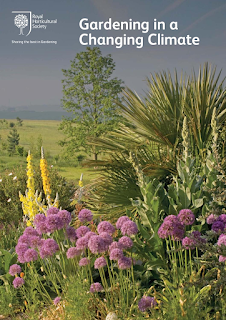David is known to some of us, particularly for articles written for Village Link. He is a member of the Chartered Institute for Horticulture and is currently based in Houghton,Carlisle. David’s career spans forty plus years. After looking after his parents’ large garden in the 1970s, he joined Leeds City Council as an apprentice gardener at sixteen. Post university he worked in conservation in the UK, spent time in India and latterly was a viticulturist in Italy. He currently works for the government, managing plant health control in the North of England; e.g. the statutory notification of Category A - Pests & Diseases). David is also is an advisor for potential vineyard sites in England.
Accurate information may be accessed from the RHS with their publication in April 2017
https://www.rhs.org.uk/science/gardening-in-a-changing-world/climate-change
Weather has changed dramatically in the last decade resulting is 29 extra growing days in the year! Seasons are becoming less defined with warming (drought in summer) coupled with heavy rains and storms. And the pattern is becoming less predictable over time. So flood management (e.g. Cumbria & West Country) and water storage (e.g. East Anglia) are now priorities.
Due to seasonal blurring, flowering plants are blooming earlier than previously; so in evolutionary terms there is likely to be a current mismatch for their pollinating insects.
So what can we do as gardeners?
TIPS / IDEAS
1. Source plants from reliable nurseries and growers to reduce risks of introducing pests and diseases
2. Trees – Planting smaller trees species will mean that they are more resilient to storm damage. Smaller trees (e.g. Acacia dealbata) have larger root systems compared to their leaf canopy surface. Tree whips planted without support produce stronger trees long term. In the south consider planting non indigenous species. E.g. In Kew Gardens where the soil is free draining (sand and gravel), the beech trees are under stress (and so are susceptible to disease) caused by summer droughts and in winter rains are leeching out nutrients and destabilising the soil.
3. Introduce Mediterranean plants where there is drought. Consider growing peaches, olives and almonds (maybe not in Cumbria though).
4. Decrease the amount of lawn (which is a monoculture), consider ‘No Mow May’. Learn to appreciate mixed lawns.
5. Rethink borders, summer displays are increasingly difficult to irrigate. Recognise drought lovers.
6. Raised beds reduce problems of waterlogging.
6. Read Beth Chatto’s book, The Dry Garden, first published in 1978!
With these climate changes viticulture has become an emerging industry in England and Wales. However viticulturists will need to be mindful of those late ‘naughty’ frosts that occur: so aspect and altitude will need consideration. (Historically Henry VIII was the first to nurture the hope of a growing grapes for wine in the sixteenth century!) Indeed prestigious Champagne houses are currently competing for potential land to cultivate grapes, especially in the south of England. However such investment will only be possible if the land is free of Category A (Notifiable) Plant Pests & Diseases.
With global plant mobility and climate change; so also come new threats for plant health in the UK.
https://planthealthportal.defra.gov.uk/pests-and-diseases/pest-and-disease-factsheets/notifiable-diseases/
Xylella fastidiosa (BACTERIAL) - colonises the xylem vessels of plant systems, leading to internal dehydration with wilt, dieback & leaf scorch
Phytophthora (FUNGAL) – P. ramorum (oak USAand larch trees) / P. kernoviae (rhododendrons)
Anoplohora chinensis / Citrus Long Horn (BEETLE) – feed inside tress and weaken them
Dryocosmus kuriphilus / Oriental Chestnut Gall (WASP)
Anoplophora glabripennis / Asian Longhorn (BETTLE) – found in certain trees, that survive in wood plallets that are untreated.
Candidatus liberibacter / Zebra Chip Potato Disease (BACTERIAL)
David believes that if we can modify and evolve our gardening methods to suit the climate changes we can help to sustain our plant whilst growing beautiful and healthy plants. In the UK it is estimated that there are 23 million gardens. As individuals and collectively we CAN make a difference.


No comments:
Post a Comment